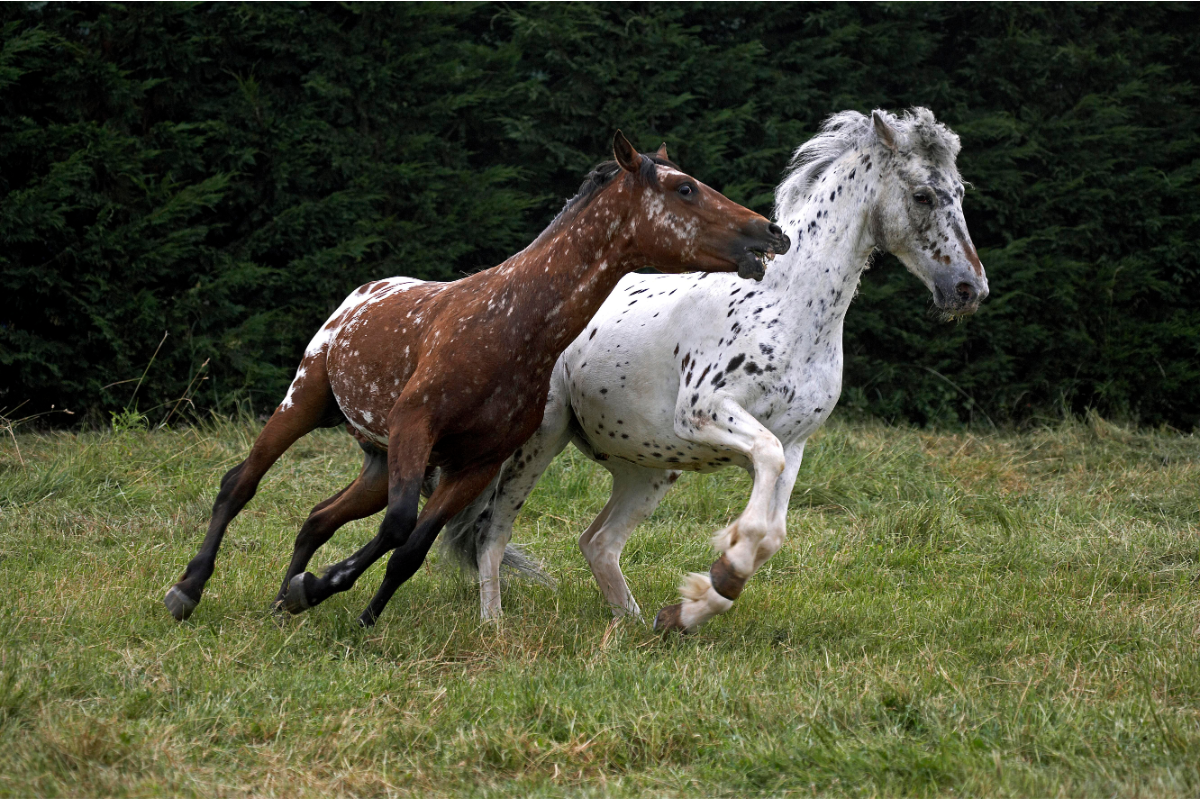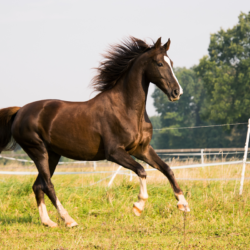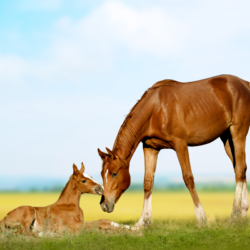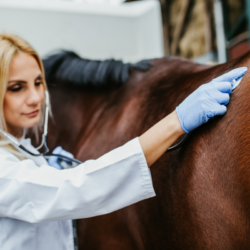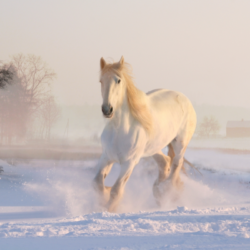Reactivity in horses is a defensive or oppositional behaviour often perceived as resistance to the rider’s demands. This phenomenon can manifest itself in various forms, such as refusal to advance, rearing, bucking or abrupt reactions, and is generally seen as a response to physical, psychological or environmental discomfort. From a technical perspective, reactivity results from complex interactions between intrinsic (pain, stress, temperament) and extrinsic (handling techniques, environment, equipment) factors. Understanding the underlying causes of this behaviour is essential to establishing an appropriate approach that aims to restore the horse’s confidence and cooperation.
What is reactivity?
Reactivity is a state of opposition in which a horse responds defensively or aggressively to human stimuli, such as weight, aids or specific requests. These behaviours, often called defences, reflect a strategy of avoidance or rejection in the face of a situation perceived as uncomfortable or threatening.
What are typical reactive behaviours?
- Avoidance: heaviness, slowness, refusal to move forward, drowsiness, flight, sudden acceleration, head shaking, snatching the reins, rigidity, physical opposition, rolling or scratching the ground.
- Aggression: ass kicking, leaping, rearing, chasing, charging, biting, threatening blows (head, foreleg, hindleg), and prone ears accompanied by tail wagging.
These behaviours reflect more or less marked opposition to a situation imposed by humans. Displays of avoidance are generally aimed at getting round the problem, while aggressive actions express a more frontal rejection.
It is essential to differentiate between defences and signs of chronic malaise (hypotonicity, apathy, low neckline, blank stare) and emotional or physiological reactions (outbursts of surprise, fear, pain, analgesic postures). Unlike the latter, defensive behaviours have a precise purpose: to express a clear refusal, often in reaction to a constraint deemed unbearable.
Thus, reactivity is part of a self-protection dynamic, reflecting a desire to say “I don’t want to” in the face of a harmful situation.
What are the possible causes of these behaviours?
Reactivity in horses often stems from physical suffering or discomfort. Pain in the back, limbs or teeth, or digestive or hormonal problems can explain these behaviours. Although these causes can be identified by veterinary, osteopathic or dental examinations, the diagnosis sometimes remains uncertain. In such cases, the precautionary principle must be applied: pain must be presumed in cases of reactivity.
However, reactivity is not always linked to a physical problem. The horse may express reactivity because of fatigue, boredom or disinterest in the proposed activity. It may also be disturbed by unmet needs, such as hunger, the stress of social separation (gregariousness) or an uncomfortable relationship with its rider. These factors reflect a mismatch between human expectations and the horse’s needs or personality.
Unlike humans, horses do not have the cognitive capacity to attribute negative intentions or simulate behaviour. Its underdeveloped prefrontal cortex prevents it from conceptualising notions such as good or evil. Therefore, any lack of cooperation in the horse reflects a sincere and instinctive response to discomfort, disagreement or a situation perceived as inappropriate.
A restive horse expresses a difficulty or rejection linked to its environment, its relationships or its experiences. It is therefore up to humans to ask themselves the right questions:
- Is he suffering physically?
- Is his equipment suitable?
- Does he live in a favourable environment?
- Are his basic needs (walking, feeding and companionship) met?
- Are my requests fair and understandable to him?
Respecting a horse’s personality and psychological integrity is a major ethical and global health issue.
What can I do about it?
Reactivity in horses requires a considered approach in order to identify its underlying causes and support its recovery in an effective and respectful manner.
Finding the causes
The first step is to look for the origins of the reactivity in order to remedy it:
- Unsuitable equipment: Have the saddle and mouthpiece assessed by specialists (saddle fitter, bit fitter).
- Physical pain: Carry out a complete check-up with a vet, osteopath, dentist or shiatsu practitioner, including in-depth examinations (x-rays, ultrasound scans) if necessary.
- Environment: Provide your horse with the best possible environment: herd life, free access to hay, and sufficient space (ideally 1 hectare per horse).
- Relationship with the rider: Call on the services of an equine coach or ethologist to improve communication and the quality of your interactions.
Adapting the horse’s work
Progressive, structured work is essential:
- Work on foot: Build confidence and lay solid foundations through regular, progressive exercises. The 7 Parelli games offer an accessible and effective method.
- Mounted recovery: Go back to basics, asking for simple responses, just like when breaking in. Involve someone on the ground to ease the transition.
Phytotherapy
Phytotherapy and aromatherapy also offer natural solutions to help horses manage stress, pain and specific disorders.
To soothe a reactive or stressed horse, choose relaxing plants:
- Passionflower: helps calm anxiety.
- CBD: reduces stress and promotes better muscle relaxation.
- Bach Flower Remedies: particularly the Rescue blend for stressful situations.
- Chamomile: relaxing and soothing, ideal for nervous horses.
- Griffonia and fig tree: promote serenity and balance emotions.
For horses suffering from abdominal pain or ulcers:
- Ginger: anti-inflammatory and digestive stimulant.
- Brewer’s yeast: balances intestinal flora.
- Chamomile: reduces digestive irritation and calms spasms.
For horses with muscular or joint pain:
- Meadowsweet, white willow and blackcurrant: with natural anti-inflammatory properties.
- Arnica and horse chestnut: effective against aches and pains and trauma.
- Sweet clover: improves circulation and soothes tension.
- Essential oils: massage with lemon eucalyptus or wintergreen oil to relieve muscle and joint pain.
Yarrow and chasteberry can be given to mares suffering from discomfort linked to hormonal cycles. They regulate hormonal imbalances and soothe ovarian pain.
Work calmly and patiently, avoiding any coercion. Respect the horse’s personality and needs to establish a lasting relationship based on trust and mutual respect.

